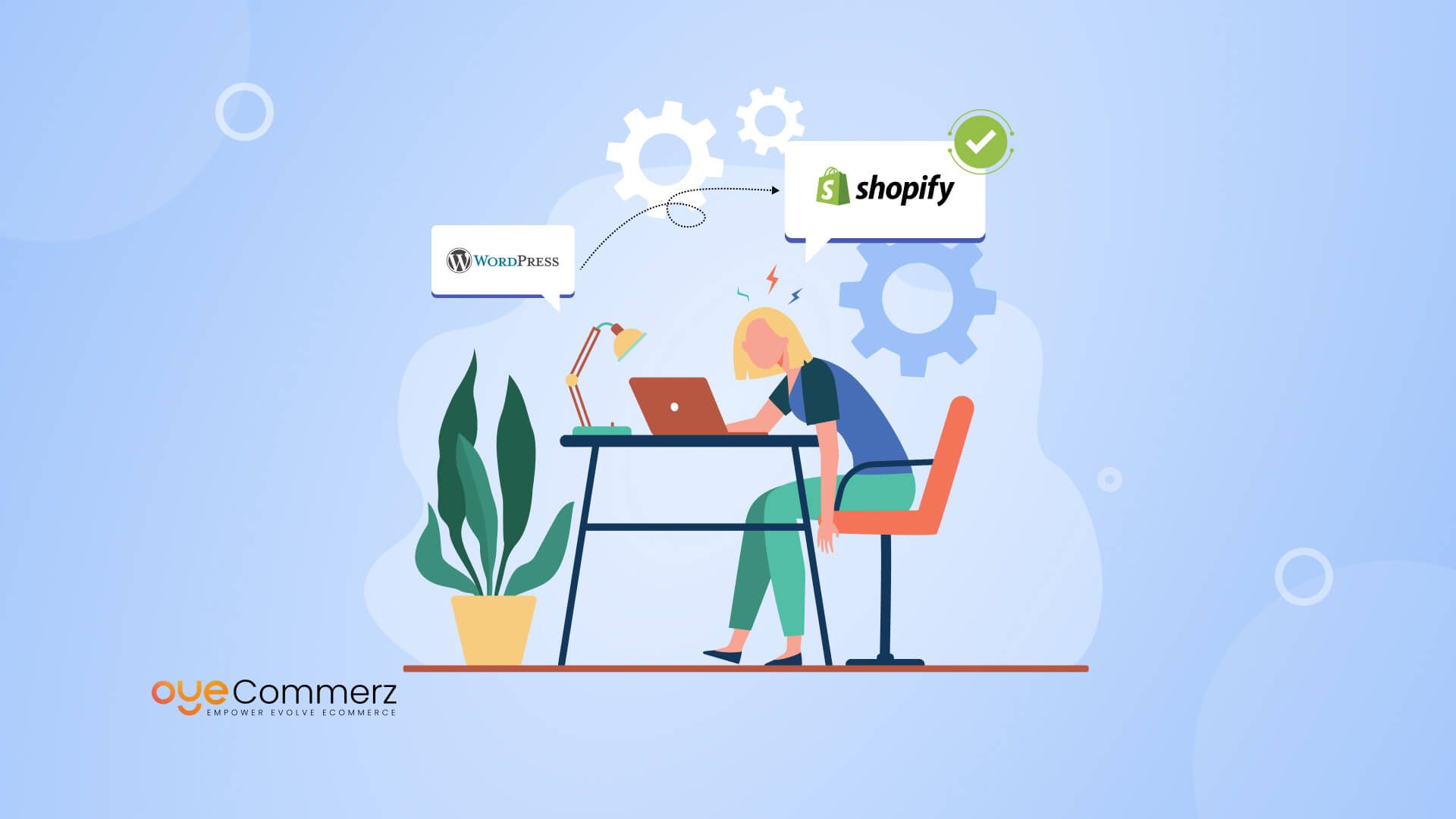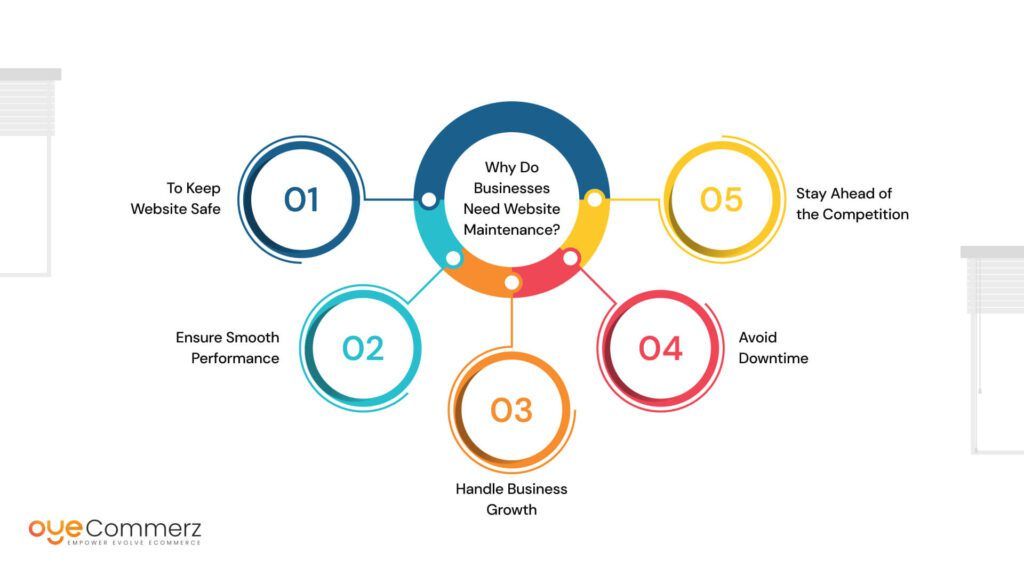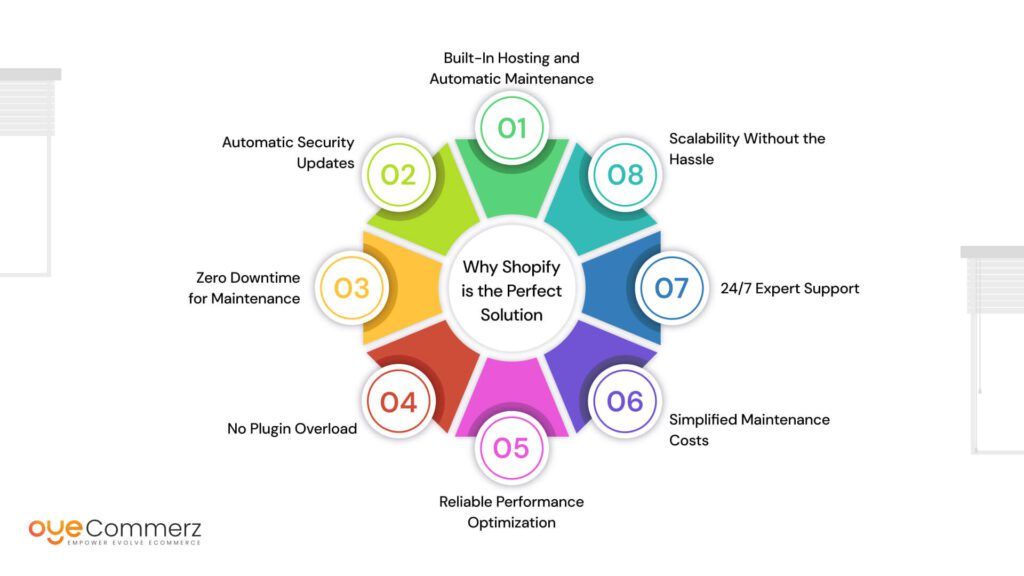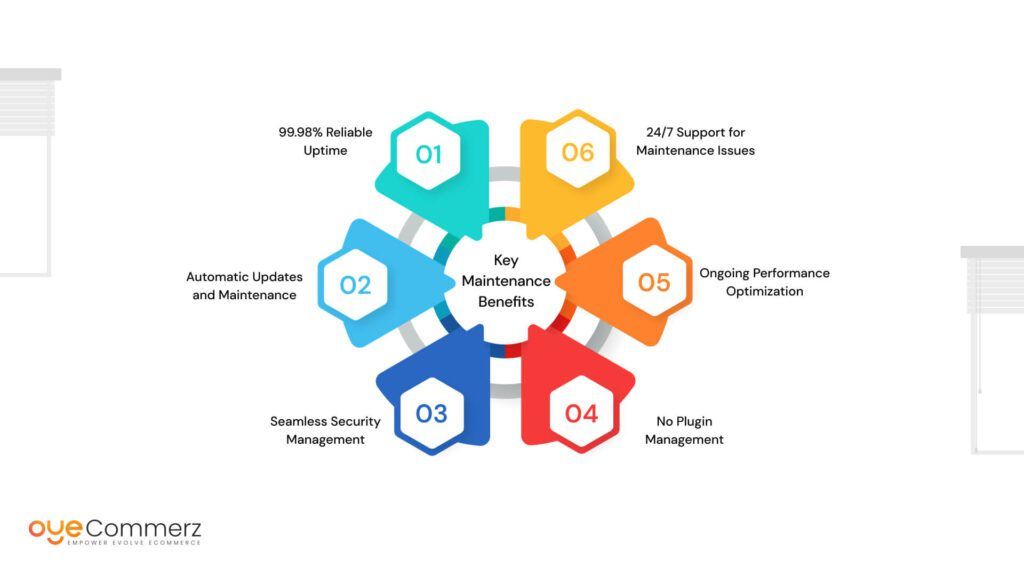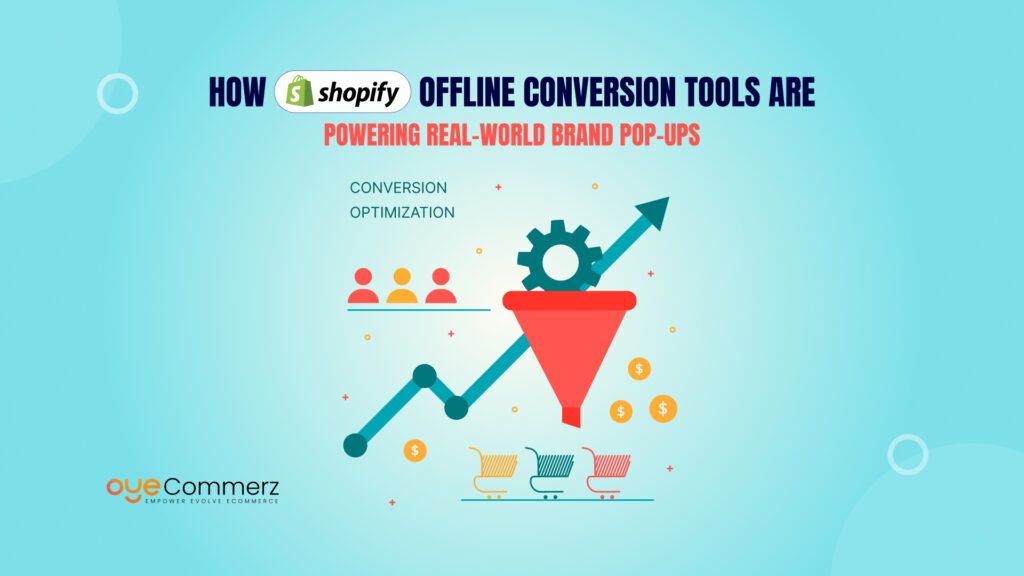Are you a business owner tired of dealing with WordPress maintenance, endless updates, and constant bugs? Many businesses face these challenges, losing valuable time that could be spent on growing their business. When you convert WordPress to Shopify, you leave behind the technical struggles and embrace a smooth, worry-free platform that offers up to 99.98% reliable uptime.
Shopify’s reliable, user-friendly system takes care of hosting, security, and updates, so you can focus on what truly matters to your customers and sales. No more troubleshooting or worrying about your site breaking. Make the switch and experience a platform built for growth, efficiency, and peace of mind. Ready to take the next step? Let’s get started!
Table of Contents
ToggleWhat Really is Website Maintenance?
Website maintenance refers to the ongoing process of keeping your website secure, functional, and up-to-date. It involves a range of activities designed to ensure that your website operates smoothly and delivers a great user experience. These activities are essential for protecting your site from security vulnerabilities, ensuring consistent performance, and supporting business growth.
Key Aspects of Website Maintenance Include:
- Updating Software and Plugins:
Websites built on platforms like WordPress require frequent updates to the core software, themes, and plugins. These updates help patch security vulnerabilities, introduce new features, and ensure compatibility across the system. - Ensuring Security:
Regular maintenance is crucial for protecting your website against cyber threats, such as malware attacks, hacking attempts, and data breaches. Tasks like installing security patches, managing SSL certificates, and performing security scans are all part of website maintenance. - Fixing Bugs and Errors:
Websites can develop issues over time, such as broken links, missing images, or functionality glitches. Maintenance includes identifying and fixing these problems to ensure the site runs smoothly. - Optimizing Performance:
Slow-loading websites can drive users away. Maintenance activities like image optimization, database cleanups, and caching ensure your website loads quickly and provides a seamless experience. - Backups and Recovery:
Creating regular backups ensures you can restore your website quickly in case of data loss or unexpected issues. Maintenance plans often include automated backups for peace of mind. - Monitoring and Analytics:
Regularly checking website analytics helps track performance, identify issues, and understand user behavior. This information allows you to make data-driven decisions to improve your website.
Why Do Businesses Need Website Maintenance?
1. To Keep Website Safe
Regular website maintenance, including timely updates, is essential for protecting your website from hackers and security vulnerabilities. When security patches aren’t applied, outdated software can leave your site open to cyberattacks, data breaches, or malware infections. By staying on top of updates, you ensure your website is secure and your customer data remains safe, preventing the costly consequences of a security breach.
2. Ensure Smooth Performance
Websites that aren’t properly maintained often suffer from performance issues. Old themes, plugins, or outdated software can significantly slow down your website, resulting in slower load times or errors. Visitors are less likely to stay on a slow website, and search engines may rank you lower due to poor performance. Regular updates and optimization are needed to keep your site running smoothly and provide a fast, seamless experience for your users.
3. Handle Business Growth
As your business grows, so do your website’s demands. More visitors, additional product listings, and increased transaction volume require a website that can scale easily. Without proper maintenance, your website may struggle to keep up with the increased load, leading to performance issues or even crashes. Maintenance ensures that your website infrastructure can handle these changes, so your business continues to run smoothly as it grows.
4. Avoid Downtime
A website that isn’t properly maintained is more likely to experience technical issues, leading to unexpected downtime. Every minute your site is down means lost sales, potential customers who are frustrated or unable to make purchases, and damage to your reputation. By regularly maintaining your website, you can identify and address potential issues before they cause downtime, ensuring your website stays up and running.
5. Stay Ahead of the Competition
In today’s digital world, it’s crucial to keep your website updated with the latest trends, technologies, and features. A website that is outdated or poorly maintained can make your business appear behind the times, which may lead to customers choosing your competitors. Regular maintenance ensures your site stays modern, functional, and aligned with customer expectations, helping you stay competitive in the marketplace.
“Website maintenance is important, but it shouldn’t take up your time or money. Let’s see how Shopify takes this burden off your shoulders.”
The Challenges of Website Maintenance on WordPress
Time-Consuming Maintenance
- WordPress requires regular updates for plugins, themes, and the core system to function properly.
- These updates need to be done frequently to keep everything secure and running smoothly, but they take up a lot of time.
- Managing these updates can be overwhelming, especially when you have other business tasks to focus on. Missed updates can lead to bugs or security issues.
Security Risks from Maintenance Gaps
- Without regular maintenance, WordPress websites become vulnerable to security breaches.
- Plugins and themes often have security flaws that need to be patched through updates. If you’re not on top of these, hackers can exploit weaknesses in your site.
- Handling security updates and troubleshooting potential issues requires technical know-how or hiring a developer.
Downtime Due to Updates
- Updates, especially for plugins and themes, can sometimes cause errors or even crash your site if not done properly.
- This means you need to monitor and test your website after every update, which can result in unexpected downtime.
- Any downtime leads to lost sales, frustrated customers, and a damaged reputation.
Plugin Overload for Functionality
- WordPress relies on plugins to add new features or enhance functionality.
- Managing and updating multiple plugins can become a maintenance nightmare. Sometimes plugins conflict with each other, causing parts of your site to break.
- These issues require troubleshooting and time to ensure everything is working correctly, distracting from business operations.
The Ongoing Need for Developer Support
- WordPress websites often require developer help for custom updates, fixing bugs, or ensuring compatibility between plugins and themes.
- This can be costly, especially if problems arise unexpectedly. Relying on developers for ongoing maintenance adds both time and expense to running your business.
- The need for continuous maintenance or developer involvement can be draining, both in terms of resources and energy.
These challenges make WordPress maintenance a time-consuming and costly task that can distract business owners from focusing on their core goals.
Why Shopify is the Perfect Solution for Hassle-Free Maintenance
1. Built-In Hosting and Automatic Maintenance
Shopify provides fully managed hosting and automatically handles updates, backups, and performance optimization. Unlike platforms like WordPress, where you need to manage hosting servers, backups, and software upgrades, Shopify takes care of everything in the background. This eliminates the need for technical expertise, reduces manual intervention, and ensures your store runs smoothly at all times. You save time, effort, and money that would otherwise go into managing these tasks.
2. Automatic Security Updates
Security is built into Shopify’s core. The platform automatically updates security features to protect your store from vulnerabilities, without requiring any manual action on your part. This includes automatic SSL certificates to secure your website, protect customer data, and build trust. You no longer need to patch vulnerabilities, install security plugins, or hire security specialists. Shopify ensures your store remains safe from hacking attempts, giving you peace of mind.
3. Zero Downtime for Maintenance
With Shopify, updates and maintenance tasks happen seamlessly in the background without causing downtime. Unlike WordPress, where updates might disrupt your website or require scheduled maintenance windows, Shopify ensures that your store stays online 24/7. This means your customers can always access your store without interruptions, and you won’t lose sales or damage your reputation due to unexpected downtime.
4. No Plugin Overload
Shopify includes built-in features for payments, SEO, analytics, marketing, and more, reducing the reliance on third-party plugins. On WordPress, plugins are often required for basic functionalities, but they come with their own challenges: regular updates, compatibility issues, and potential errors. Shopify’s all-in-one platform eliminates these risks, saving you time on maintenance and troubleshooting, so you can focus on growing your business.
5. Reliable Performance Optimization
Shopify optimizes its platform continuously to deliver high performance, fast load times, and seamless customer experiences. Even as your business scales adding more products, traffic, and sales Shopify’s infrastructure handles it effortlessly without requiring manual performance tweaks. Unlike WordPress, where you need optimization plugins or developer support to address slowdowns, Shopify does the heavy lifting to keep your store running smoothly.
6. Simplified Maintenance Costs
Shopify’s pricing is straightforward and includes hosting, security, updates, and technical support. With WordPress, maintenance costs can add up quickly server fees, security plugins, developer fees, and troubleshooting expenses. Shopify eliminates these hidden costs, providing a predictable, all-inclusive solution that makes budgeting easier. This allows you to reinvest the money saved into growing your business.
7. 24/7 Expert Support
Shopify offers round-the-clock customer support to resolve any maintenance-related issues promptly. Whether you have questions about security, updates, or performance, Shopify’s expert team is always available to help. This eliminates the stress of troubleshooting technical problems on your own or waiting for third-party developers to respond. With instant access to reliable support, you can ensure your store operates smoothly at all times.
8. Scalability Without the Hassle
As your business grows, Shopify effortlessly scales with you. Whether it’s an increase in traffic, new product listings, or higher order volumes, Shopify’s infrastructure is built to handle it without performance drops or technical challenges. On platforms like WordPress, scaling requires constant maintenance, manual optimizations, and expensive upgrades. With Shopify, everything is managed automatically, so you can focus on growth without worrying about technical roadblocks.
By handling hosting, security, updates, performance, and scalability, Shopify eliminates the hassle of website maintenance. You can focus on running and growing your business while Shopify ensures your store stays secure, fast, and reliable.
Key Maintenance Benefits of Switching to Shopify
1. 99.98% Reliable Uptime
One of Shopify’s greatest strengths is its guaranteed 99.98% uptime, ensuring your store is almost always online and accessible to customers. Unlike other platforms where you need to constantly monitor hosting servers or perform regular updates, Shopify handles everything in the background. This means you don’t have to worry about unexpected downtime caused by maintenance tasks, server failures, or technical glitches. Your customers can shop seamlessly, and you’ll avoid losing sales due to an offline website.
2. Automatic Updates and Maintenance
Shopify takes the burden of maintenance off your shoulders with automatic updates to your store’s software, security features, and performance enhancements. Instead of manually installing updates for plugins, themes, or the platform itself (like on WordPress), Shopify ensures your website is always running on the latest version without any action on your part. This guarantees your store stays secure, efficient, and optimized while saving you time and the hassle of performing maintenance tasks.
3. Seamless Security Management
Security is a top concern for any online business, and Shopify excels in this area. It provides built-in, enterprise-grade security features, including SSL certificates to encrypt customer data and regular automatic security updates to protect against vulnerabilities. Unlike platforms that rely on plugins or manual patching, Shopify manages security seamlessly in the background. This eliminates the need to hire experts or worry about breaches, giving you peace of mind that your store and customer data are always safe.
4. No Plugin Management
On platforms like WordPress, businesses rely heavily on third-party plugins for essential features like SEO, payments, or marketing tools. These plugins often require constant updates and can cause compatibility issues, leading to errors or downtime. Shopify, on the other hand, offers a comprehensive, all-in-one platform with built-in tools for payments, marketing, SEO, and analytics. This reduces the need for external plugins, minimizing maintenance work and saving you from the frustration of troubleshooting plugin conflicts.
5. Ongoing Performance Optimization
Shopify continuously optimizes its platform to ensure high performance for your store. As your business grows, you don’t need to worry about manually tweaking your website settings or managing performance issues during high traffic spikes. Shopify’s infrastructure is designed to handle increasing product listings, visitors, and transactions without slowdowns. This means your store remains fast and responsive at all times, enhancing customer experience and boosting SEO rankings.
6. 24/7 Support for Maintenance Issues
Shopify offers round-the-clock customer support to address any maintenance-related concerns. Whether you’re dealing with a performance issue, security question, or need assistance with updates, Shopify’s expert support team is available 24/7 to help. This level of dedicated support reduces the stress of managing maintenance on your own and ensures your store continues to operate smoothly.
By switching to Shopify, you’re choosing a platform that eliminates maintenance headaches and keeps your store secure, optimized, and available to customers at all times. From automatic updates to built-in security and 24/7 support, Shopify allows you to focus on running and growing your business while the technical details are taken care of for you.
Is Shopify Right for Your Business?
Types of Businesses That Benefit Most from Shopify
E-commerce Stores
- Whether you’re selling physical products, digital goods, or services, Shopify is designed to manage online stores efficiently.
- It provides all the tools you need for inventory management, order processing, and payments, making it ideal for e-commerce businesses.
Growing Brands
- Shopify is perfect for businesses that are scaling rapidly. It can handle increased traffic, more products, and higher sales volume without performance issues.
- With built-in tools for marketing, SEO, and analytics, Shopify helps growing brands manage expansion seamlessly.
Startups and Entrepreneurs
- For new businesses and entrepreneurs, Shopify provides an easy-to-use platform with minimal technical knowledge required.
- Its drag-and-drop design tools and pre-built themes make it simple to get started without hiring a developer.
Multi-Channel Retailers
- If you’re selling on multiple platforms like Amazon, eBay, or social media, Shopify can integrate and manage all your sales channels from one place.
- It’s ideal for businesses that want to streamline their operations across different sales outlets.
Subscription-Based Businesses
- Shopify’s subscription tools make it an excellent choice for businesses offering subscription products or services.
- From managing recurring payments to customizing subscription plans, Shopify makes it easy to run a subscription model.
How Oyecommerz Can Help You Migrate Smoothly
At Oyecommerz, we specialize in seamless Shopify migrations with a focus on reducing maintenance hassles. Our expert team ensures a smooth and efficient transition from your current platform to Shopify, so you can say goodbye to constant maintenance headaches.
Benefits of Working with Oyecommerz for Your Shopify Migration:
- Zero Downtime: We handle the migration process carefully to ensure your store remains operational without any interruptions, so you don’t lose sales or customer trust during the transition.
- Data Accuracy: All your product, customer, and order data is accurately transferred to Shopify, ensuring no errors and a hassle-free setup, reducing the need for post-migration maintenance.
- Expert Support Throughout the Process: Our team provides ongoing support throughout the migration, ensuring that any issues related to updates, security, and performance are handled efficiently, minimizing your future maintenance needs.
By migrating to Shopify with Oyecommerz, you’ll experience reduced maintenance burdens, giving you more time to focus on growing your business.
Ready to Migrate to Shopify ? Let Us Help You Make the Switch!
Conclusion
Shopify removes the hassle of website maintenance by offering automatic updates, built-in security, and a reliable platform that ensures your store runs smoothly. With 99.98% uptime and the scalability to support your growth, Shopify simplifies the process so you can focus on what matters most expanding your business.
Ready to stop worrying about maintenance and focus on growth?
Contact us today to Convert WordPress to Shopify and make the switch to a smoother, more efficient e-commerce experience!
Frequently Asked Questions
Yes, you can transfer a WordPress site to Shopify by migrating your content, products, and customer data. Shopify provides tools and apps like Matrixify and the Shopify Importer to help with migration. You may need to manually set up themes and design elements to match your previous site.
Yes, you can convert your website to Shopify by moving your domain, importing content and products, and customizing your Shopify store. Shopify provides built-in eCommerce features and themes to help recreate your site’s functionality.
WordPress and Shopify are separate platforms, but you can integrate them. You can keep your WordPress blog and link it to your Shopify store or use Shopify’s Buy Button to sell products on your WordPress site.
You can export products from WordPress (WooCommerce) to Shopify by:
- Exporting WooCommerce Products: Go to WooCommerce > Products > Export and download a CSV file.
- Importing to Shopify: In your Shopify admin, go to Products > Import, then upload the CSV file.
- Using Migration Apps: Tools like Matrixify or Cart2Cart can automate the process for larger stores.

